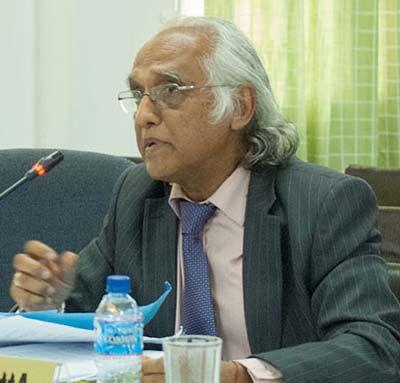As an avid poll watcher (of USA and several other countries) and someone who has being conducting polls for four decades in the Caribbean, India, and elsewhere, I was approached to give my views on Mr. “Chris Ram’s Internet Polling” mode that was utilized to determine public views on whether a referendum should be held on renegotiating the oil contract. Internet polling is welcomed in Guyana, and it is hoped there would be more and that it will be institutionalized. Although the latter is far from reality in internet and technology challenged Guyana, it is increasingly being used in other countries to solicit public reaction or views on important issues including on approval ratings of politicians.
Chris Ram’s name is affiliated with the survey because it is believed that he and a few others constructed it and decided to conduct it on the internet. He has strong views on oil renegotiation, and they as well as the man himself are respected. Chris Ram has a reputation of uncompromising integrity and as a brilliant thinker and writer with few local comparisons, one of the most respected chartered accountants, and an individual of courage who challenged authoritarianism. He is the kind of lawyer or accountant one would prefer to have on one’s side. It is also known that he supported political change in 2011, 2015, and 2020. He was in the forefront in the struggle when democracy was under pressure and the constitution violated, and when attempts were made to rig the 2020 elections. He spared no personal expenses to mount legal challenges and represented many clients gratis. We may not be in agreement on issues, but he fought fairly, fearlessly, and courageously for his political position and on what he thinks is right for nation including on oil renegotiation. Regardless of how one feels about him personally, Chris Ram must be recognized and honored for his role against authoritarian tendencies and saving democracy in 2020. And one must commend his and the efforts of others of introducing and conducting a poll (on line), a new idea in our country.
It is well known that political polling (not general anthropological and other social science surveying) in Guyana was introduced by Dr. Baytoram Ramharack, Ravi Dev, Vassan Ramracha, myself and a few others in the late 1980s, polling that benefited Dr. Jagan and the PPP and other PCD parties. Ramharack and I studied polling in USA when we were graduate students during the 1980s. Polling is the most reliable method of obtaining public views (as a percentage) on issues (aside from voting and or referendums). A traditional paper and writing utensil mode of surveying was used then and still being used by this writer in latest polling. Other pollsters have gravitated to other modes of polling using the latest technology.
Polling has undergone significant change since it was introduced almost a century ago. Different modes have been introduced over time with the latest one being “internet polling” as used by ram and others. The evolution of polling began with straw polling (unscientific generalized opinions, unrepresentative of the voting population), then PAPI (Pen and Paper Personal Interview), CAPI (Computer Assisted Personal Interview), CATI (Computer-Assisted Telephone Interviewing), CAWI (Computer Assisted Web Interviewing) and now internet. There are advantages and disadvantages in each mode of polling. No need to go into them as that is not the focus in this essay.
Most polls were and are still conducted on telephone, relying on live interviewers to call randomly selected people for their views to represent the population. Some pollsters are experimenting utilizing the internet because it is cheaper and quicker to obtain results. It has taken survey researchers some time to adapt to the idea of online surveys. Many approval ratings polls were and are done online rather than utilizing phone polls. On Line polling has its challenges and pollster are addressing them to limit errors. When results or findings of polls were or are released, pollsters tend to inform the public the mode of surveying. Chris Ram did same! It was not a commissioned poll but one based on volunteerism. He (and colleagues) have met all the requirements of a genuine survey — outlined the methodology used, the questionnaire, how the findings were obtained, and publication for public consumption. Because of issues pertaining to reliability of internet and the small number of people who have access to internet, responses to internet polling in Guyana would be low – no fault of the sponsors of the survey. They have done well within the limitations.
As for the results of the poll, more and more people have become familiar with the presence of Exxon operations in Guyana. From nine years ago, when only a small percentage knew and or cared about Exxon’s drilling and production operations, today almost everyone knows about the oil giant’s presence in Guyana as per field surveys conducted annually. Almost everyone supports oil and gas production and welcome the infusion of revenues into the economy.
On referendum or a plebiscite, it is the best option of law making. It is a form of direct democracy that was used centuries ago in ancient Athens. More and more countries and all the states in USA have used referendums for law making. Whether politicians in Guyana support referendums as a form of law making is another question as is the legality of a referendum on a private contract after it has been signed! The latter is for the lawyers and the court.
Chris Ram and team are commended for effort on internet polling. Their work will encourage public engagement and the public’s opinions as well as input are welcomed.
Yours truly,
Vishnu Bisram
